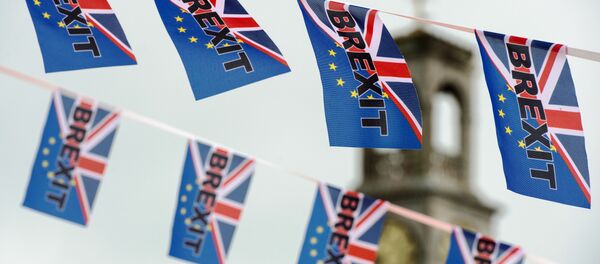Bank share prices fell dramatically in the aftermath of the vote, and on Monday June 27 trading in shares in Barclays and Royal Bank of Scotland (RBS) was temporarily suspended; RBS shares closed down 17.4 percent and shares in Barclays closed down 15.1 percent.
On August 5, RBS announced a loss of two billion pounds ($2.6 billion) for the first six months of this year, compared to a £179 million ($234 million) loss last year, although it cited £1.3 billion in costs as a result of past misconduct and litigation.
The price of RBS shares on the London Stock Exchange fell 7.19 percent after the news, and closed at 1.78 GBP per share.
The bank is 73 percent owned by UK taxpayers, who paid an average of 5.02 GBP per share when the bank was rescued in 2009 following the global financial crisis.
RBS Chief Financial Officer Ewen Stevenson told Bloomberg that he thinks Brexit is responsible for the slowdown in investment.
"There's definitely a slowdown going on," he said.
"We've seen for some time a slowdown among our corporate customer base, stalling decisions to invest in people, and investment in plants. That's continued after the referendum vote."
HSBC called the result "reasonable performance in the face of considerable uncertainty," and the bank's chairman Douglas Flint also connected the slump to the Brexit vote.
"The period ended with exceptional volatility as financial markets reacted to the UK referendum decision to leave the EU, a result that had not been anticipated," Flint said.
On July 29, Lloyds Banking Group announced 3,000 job cuts and the closure of 200 branches in the UK, linking its cost-cutting measure to the prospect of a cut in interest rates in the aftermath of Brexit.
"The outcome of the referendum has created uncertainty and a deceleration of growth seems likely," said chief executive Antonio Horta-Osorio, who added that he expected the Bank of England to cut interest rates.
"They (interest rates) will not go into negative territory because that sends out a very negative signal to the economy and we have seen what sort of effects it has across Europe."
On August 4, the Bank of England announced its decision to cut interest rates from 0.5 percent to a record low of 0.25 percent, the first cut since March 2009.
"There is a clear case for stimulus, and stimulus now," said Bank of England governor Mark Carney, and his deputy warned that the bank might cut rates even further before the end of the year, if deemed necessary.
However, some commentators are unconvinced about the banks' dire warnings about the economic consequences of Brexit, and said the Bank of England didn't really need to take such a major step in cutting interest rates.
"You need a very nervous personality to describe any of that as a crisis," wrote Lynn, arguing that the pound's drop in value as a result of Brexit is already enough of a stimulus to the UK economy.
"If that were not enough, Brexit is likely to lead to lower levels of immigration. Since a vast supply of cheap foreign workers has depressed wages, there is a real chance that earnings will start to accelerate, and possibly quite quickly. A devaluation, more government spending, and higher wages? That sounds like a big stimulus, especially for an economy running at close to full employment," Lynn wrote.
On Friday, the UK's Daily Telegraph said the Bank of England's decision on interest rates is a "policy consequence of Project Fear," not the EU referendum itself, referring to the concerted campaign to scare voters into thinking that a British exit from the EU would bring about an economic doomsday.
"Brexit voters have nothing to apologize for," the newspaper stressed.
"They can point out that the situation is worse in parts of the EU: the rate cut does not compare to the drama of Italy’s bank crisis."
"If Britain is indeed experiencing a dent in consumer confidence then it is not down to Brexit – for that hasn’t actually happened yet. Rather it is due to the pessimism of the previous government, the Labour Party, Barack Obama, global institutions, sections of the media and, of course, the Bank itself," the Telegraph said.





